Radically Gay
The Life of Harry Hay
Curator Statement
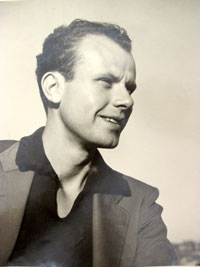
In 1948 the gay community as we know it did not exist. Homosexual was a word used only to describe those who were considered sick heterosexuals. Yet in that same year, one man had the visionary idea that homosexuals were a "cultural minority" that could be organized to create a community and fight for their human rights. Sixty years later that vision developed into a worldwide civil rights movement and inspired the creation of lesbian, gay and transgender communities on every continent. The man who had that exceptional vision was Harry Hay.
An actor, Communist labor organizer, musicologist, gay theoretician and political activist, Harry Hay left a lasting mark that continues well into the 21st century. He was active in the Los Angeles avant-garde arts movement of the 1930s where he worked as an actor. Hay participated in the San Francisco General Strike of 1934 and fought against Fascism, racism and anti-Semitism in the 1940s. In 1948 he conceived of and helped create the first sustained Gay activist group in America, the Mattachine Society. Throughout the 1950s he conducted research into areas of anthropology, science, history and mythology for evidence of what he termed "my people," the gay community. In the 1970s he worked for and supported Native American struggles and helped to define and bring together the Gay men's spirit group called the Radical Faeries. Hay continued theorizing and organizing his People and supporting social justice for all people right up to his death in 2002.
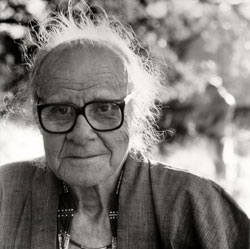
In celebration of the centennial of Harry Hay's birth in April 2012, this exhibition explores the life, ideas and contributions of the man who has rightly been called the “founder of the modern gay movement.” Drawing on original papers, ephemera, videos and personal items archived in the Harry Hay Papers, James C. Hormel Gay and Lesbian Center, San Francisco Public Library, the epic story of this compelling and complex civil rights leader is brought to life.
The exhibition follows Harry Hays life from his early years through to the founding of the Mattachine Society and onto his later activism and eventual co-founding of the Radical Faeries. Along the way we look at what were the significant events in his life that formed and enabled him to do what no one else had done before. We explore his relationship with his parents, his precocious intellect and his early acceptance and openness about his homosexuality. The exhibition examines his labor activism and involvement with the Communist Party and its People's Songs movement before moving onto the Mattachine Society period and its aftermath. His work as writer and thinker on Gay Consciousness and identity is examined along with his rediscovery by a younger generation of Gay and Lesbian activists in the 1970s. His longings and desires are explored from his earliest sexual contacts and crushes to his early 1960s meeting with inventor, John Burnside, who became Hay's "loving companion" and life partner for the last 40 years of his life. The exhibition investigates their life and activism together, culminating in their co-founding of the Radical Faeries and ending with Hay's death in 2002.
Guest curator, Joey Cain
All items in this exhibit are drawn from the Harry Hay Papers, James C. Hormel Gay and Lesbian Center, San Francisco Public Library, unless credited elsewhere.
Sponsored by the Friends of the San Francisco Public Library and the James C. Hormel Gay and Lesbian Center, San Francisco Public Library
The Making of A Radical
1912-1948
This section reviews Hay’s birth and childhood through his involvement in theater and film and onto his involvement with labor activism, the Communist Party and his music history studies.
Harry Hay's First Publicity Still, 1933
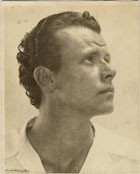
Harry acted on both the stage and in film starting in 1933. On the back of this photo he wrote, "My first PR still, for an actor's portfolio, taken by a fine lesbian photographer, Hazel Harvey, in the Spring of 1933. This was the wrong aspect to reveal in an industry poised to go mad over the likes of Clark Gable and the 'Coop'."
1937 Christmas Block Print
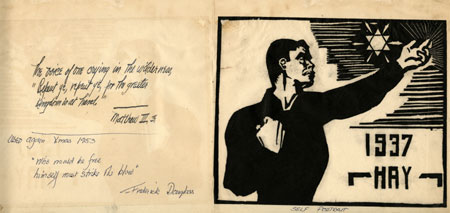
Harry designed and etched his own linoleum wood blocks. He hand printed them to produce personal, politically inspired Christmas greeting cards.
The Mattachine Years
1948-1953
This section focuses on the germination of the idea to the founding of the Mattachine Society, it's goals and activism to the removal of Harry and the other founders:
Founding Document of the Modern Gay Movement
"Preliminary Concepts: International Bachelors' Fraternal Order For Peace & Social Dignity, Sometimes Referred to as Bachelors Anonymous."
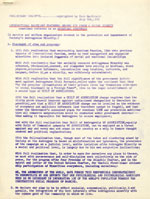
In 1948, Hay attended a beer bust in support of progressive Democratic presidential contender Henry Wallace where he talked with a few other gay men about the possibilities of creating an organization of homosexuals to lobby for the reform of anti-gay laws. Later that night he wrote up a prospectus for such an organization. No copy of that document has survived.
This document is an expanded, later version of that first document which Hay wrote in July 1950 to show his then-lover, Rudi Gernreich. Gernreich responded enthusiastically to it and its ideas and the two became the nucleus of what was to become the Mattachine Society. As such, this is the founding document of the modern gay rights movement in the USA.
Photo of the earliest Mattachine members at a Christmas party
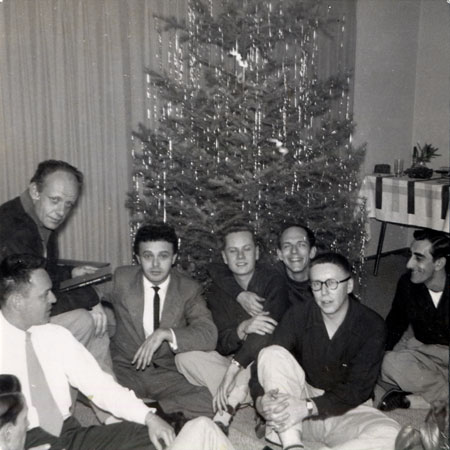
Because of the risk of arrest, Mattachine had to implement tight security measures to ensure the safety of its members which included forbidding the taking of photos of its members. This photo of a Mattachine Christmas party was secretly snapped by member John Gruber and is the only photo ever taken of the early founders. (l-r) Dale Jennings, Harry Hay, Rudi Gernreich, Stan Witt, Bob Hull, Chuck Rowland, and Paul Bernard. Missing from the photo are Konrad Stevens and Jim Gruber.
The Dream Deferred
1953-1963
This section explores the aftermath of the Mattachine takeover to Hay's summons before the House Un-American Activities Committee, and onto his research into anthropology, history and Native American studies to look for a gay history and being.
Harry Hay Taking the Oath at House Un-American Activities Committee, 1955.
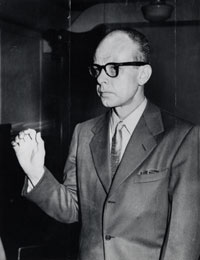
1955
Courtesy of University of Southern California,
on behalf of the USC Special Collections
Hay was summoned before the Un-American Activities Committee during its hearings in Los Angeles in 1955. He was questioned about his involvement in the Communist Party in the 1930s and 1940s.
Berdache After The Fall of Jerusalem in 587 BC, circa 1956
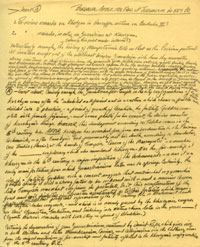
Throughout the 1950s Harry Hay pursed original research into history, literature and anthropology to find the suppressed and hidden history of gay people. His research into the Native American "berdache" laid the groundwork for later studies and the emergence of a Native American Two Spirit movement.
The Circle Of Loving Companions
1963-1978
This section covers the period when Hay and John Burnside became lovers, their activism in pre- and post-Stonewall Gay liberation, the running of their kaleidoscope business, their move to New Mexico, their activity on behalf of Native American rights, and Hay’s rediscovery by a new generation of lesbian and gay activists.
Harry Hay and John Burnside with a friend’s dog, 1965
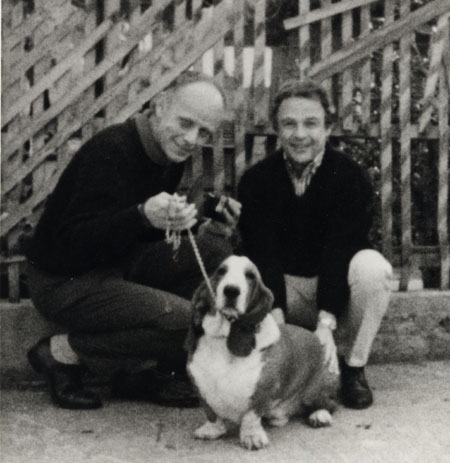
Harry and John met in 1963 and lived together as partners and loving companions until Hay's death in 2002.
A Contribution to the Principles of Gay Liberation, 1970
Harry found renewed engagement with the new spirit of radicalism among young gay and lesbian activists following the Stonewall Riots in New York in June of 1969.
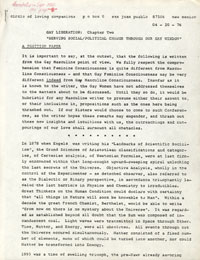
The Dream Reborn
1979-2002
This section discusses the first Radical Faeries gathering through Hay's involvement in the anti-draft movement, Jesse Jackson's Rainbow Coalition, and ongoing gay activism, as well as his and Burnside's move to San Francisco and Hay’s death in 2002.
Call for first Radical Faerie gathering, 1979
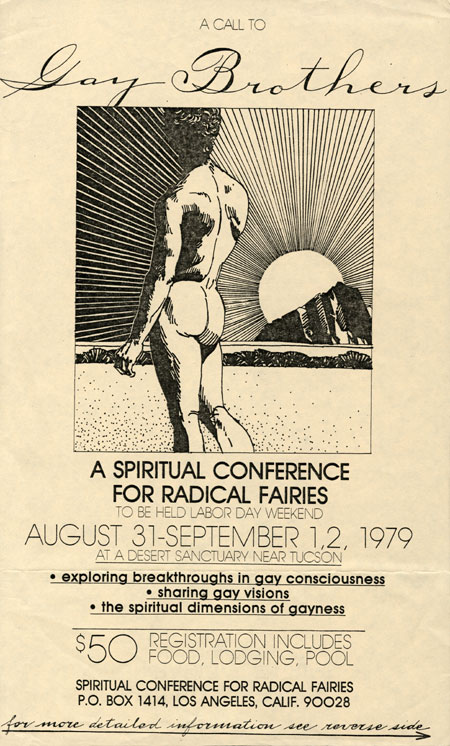
Harry and John organized the first gathering with gay activist Don Kilhefner and gay psychologist Mitch Walker. The organizers expected 50 people and more than200 showed up. The gathering sparked the now international Radical Faerie movement.
Hay protesting Dan White's parole, 1984
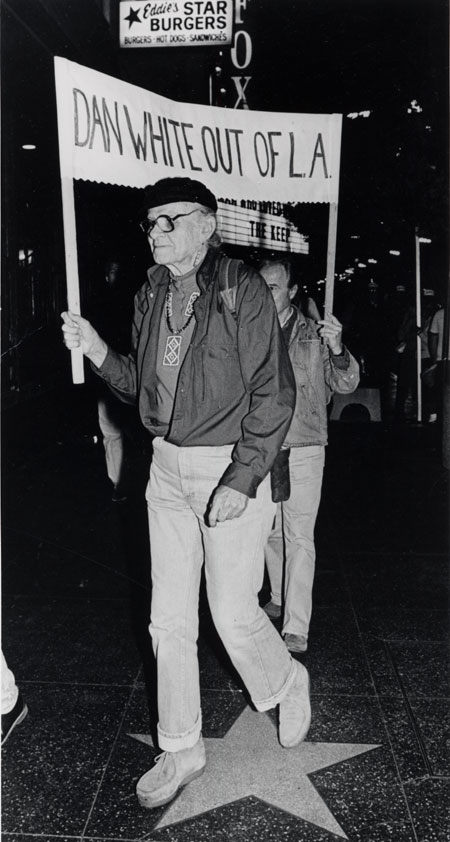
Hay was involved in organizing the protests against the planned release to Los Angeles of Dan White, the assassin of San Francisco Mayor George Moscone and gay Supervisor Harvey Milk.
Harry Hay and John Burnside In Moscow, 1991
Harry and John were part of the delegation from the United States to the first ever Gay and Lesbian Conference in Russia in 1991.

